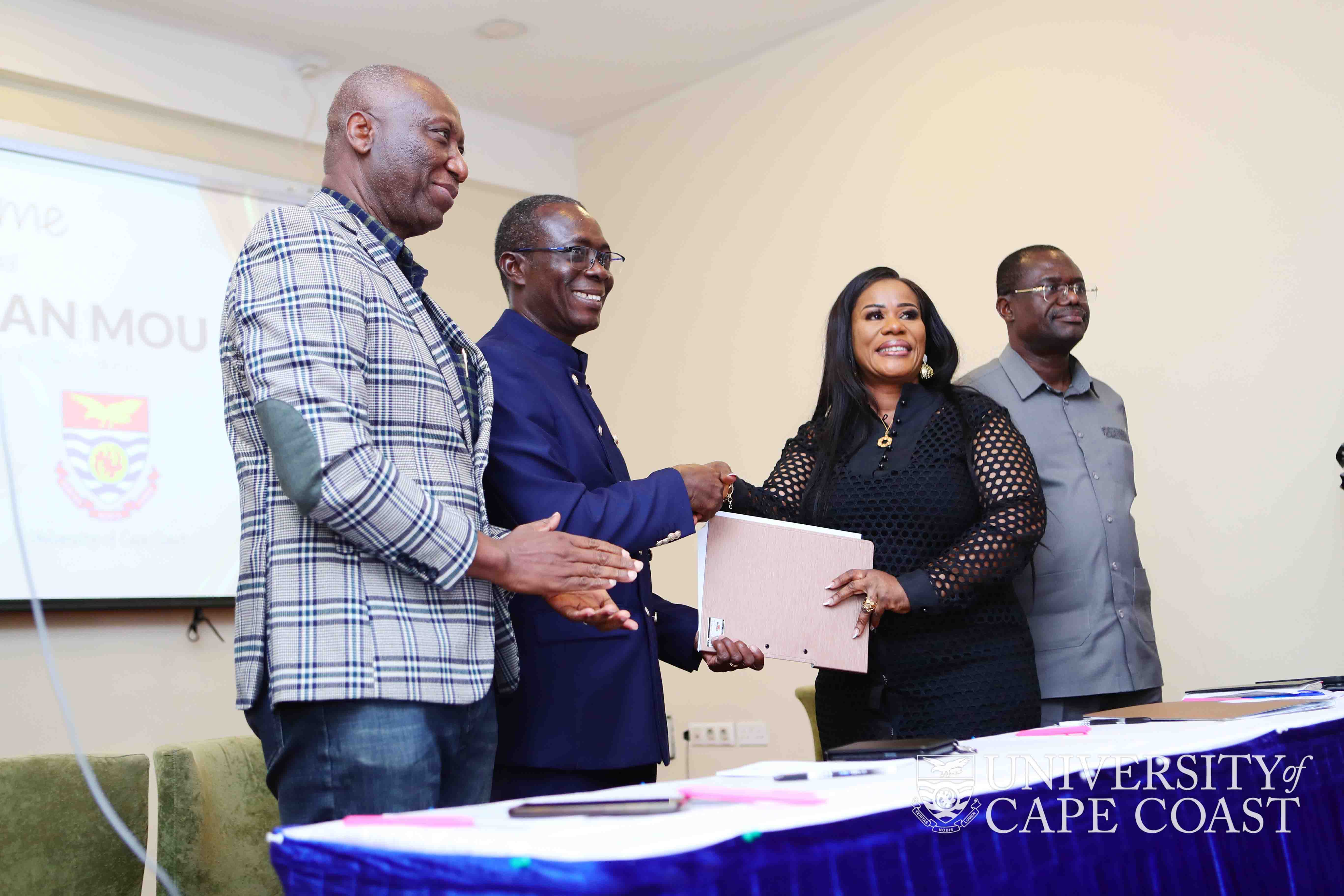The Asian African Consortium (AAC), a subsidiary of Jospong Group of Companies has signed a Memorandum of Understanding (MoU) with the University of Cape Coast (UCC) to undertake research to boost rice, maize and soyabeans production in the country.
The MoU focuses on a collaborative frame work between UCC and AAC to deepen research for social change in order to solve the challenges facing economic growth and development.
Speaking at the MoU signing ceremony, the Chief Executive Officer of AAC, Mrs. Adelaide Araba Siaw- Agyepong, noted that the agreement would facilitate ACC’s collaboration with UCC researchers to develop nutritious and high yielding crops.
The Vice-Chancellor, Johnson Nyarko Boampong exchanging the signed MoU with the CEO of ACC, Mrs. Adelaide Brew Siaw-Agyepong.
In addition, Mrs. Siaw-Agyepong said the collaboration would lead to the establishment of a research and development consortium comprising experts from business, crop science, technology, agriculture engineering, chemical engineering as a standing committee to advise on the full value chain in rice, maize, soyabean and the production of other staples.
CEO of AAC, Mrs. Adelaide Siaw-Agyepong speaking at the signing ceremony
Through the collaboration, she indicated that, seed and a seedling centre would be established for commercial production of quality seedlings of rice for sale to farmers to expand production.
Mrs. Siaw-Agyepong further explained that AAC’s and UCC integrated rice project would lead to mass production of rice for local consumption and export.
“The integrated rice project is to make Ghana self-sufficient in rice production resulting in significant economic benefit for the country,” she stressed.
Mrs. Siaw-Ageypong, was optimistic that UCC’s rich research background in rice production would propel the collaboration to create employment and promote economic growth for the country through export.
She was hopeful that the agreement would open more avenues to strengthen the collaborations between the two institutions.
In his remarks at the ceremony, the Vice-Chancellor of the University of Cape Coast, Prof. Johnson Nyarko Boampong noted that the agreement was in line with the University’s vison of training entrepreneurs to create jobs.
“We also focus on empowering our students with competencies of the 21st Century to succeed in life and this collaboration will go a long way to achieve this vision” he added.
Vice-Chancellor of UCC, Prof. Johnson Nyarko Boampong delivering his address
Prof. Boampong said the University would continue to provide the needed expertise to help the agreement materialise.
He added that the University had acquired more than 400 acres of land for commercial agriculture which would be very useful for the collaboration.
The Vice-Chancellor of UCC was worried that the country’s resources and vast arable lands were not highly utilised to ensure food sufficiency and to boost economic growth.
“It is very sad that Ghanaians have to import from other countries to feed ourselves yet there are countries with no arable lands who have found ways to produce food locally and even export” he lamented.
The Executive Chairman of Jospong Group, Dr. Joseph Siaw-Agyepong, in a brief remark noted that agriculture and research must go hand in hand to ensure that the country derives its full benefits.
Executive CEO of Jospong Group of Companies, Mr. Joseph Siaw-Agyepong
He noted that rice is now a staple food in Ghana and initiatives must be taken to produce quality and the needed quantity of grains backed by research which cannot be achieved without the academia.
Mr. Siaw-Agyepong encouraged the University to develop rice varieties and seedlings that can withstand the agro-ecological conditions in Ghana as well as produce the needed yields for maximum benefits.
“We have the knowledge and resources to see this through, therefore you have no excuse not to perform” he reminded the academia.
Present at the ceremony were the Registrar, Mr. Jeff Teye Onyame; Provost, College of Distance Education, Prof. Anokye Mohammed Adam; Head of Molecular Biology and Biotechnology; Prof. Aaron Tettey Asare; Prof. Ernest Teye of the Department of Agricultural Engineering; Head of Information Technology and Research Support, Sam Jonah, Library Mr. Kwame Boohene; Dr. Edward Nii Amar Amarteifio of the Centre for Entrepreneurship and Small Business Enterprise and Head of Monitoring and Evaluation, Mr. Daniel Yeboah Mensah.
Background
In 2023, Asian African Consortium entered into partnership with major rice industry players in Thailand and Ghana to develop an integrated rice farming project. This move by Jospong Group stemmed from the government’s decision to boost the economy through import substitution.
A core team later visited Thailand for the Ghana-Thailand Business conference in March 2023 with researchers from various universities in Ghana as well as major players in the rice industry.
It is on record that Ghana spent over GH¢6.8billion (equivalent to US$560million at current market rates) importing rice, a grain that can be produced locally.
While total rice consumption stood at 1.4 million metric tonnes in 2022, imports valued at US$560 million accounted for 800,000 metric tonnes (mt) of the consumption figure, with domestic production catering for the remaining demand – according to data from IDH Sustainable Trade, a foundation headquartered in The Netherlands.
Similarly, according to the Ministry of Food and Agriculture, between 2010 and 2020 the country’s rice imports hit a staggering US$8billion. This, in addition to imports of other food items that can be produced locally, has been a major source of concern for stakeholders.





